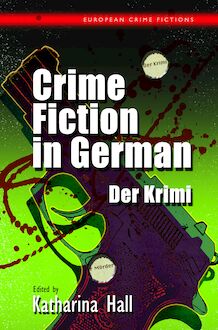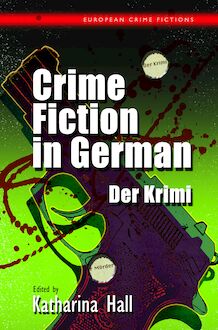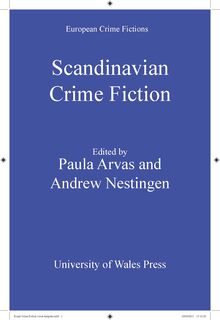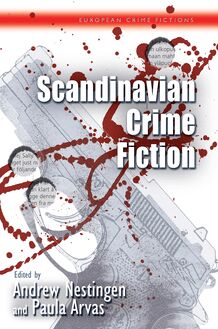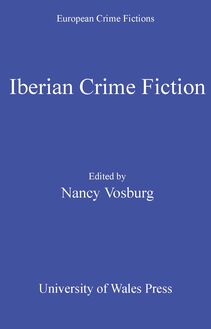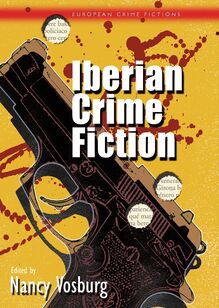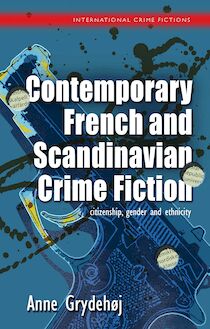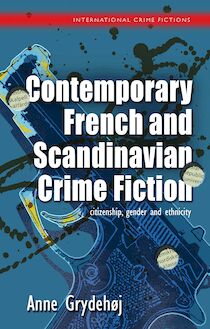-
 Univers
Univers
-
 Ebooks
Ebooks
-
 Livres audio
Livres audio
-
 Presse
Presse
-
 Podcasts
Podcasts
-
 BD
BD
-
 Documents
Documents
-
- Cours
- Révisions
- Ressources pédagogiques
- Sciences de l’éducation
- Manuels scolaires
- Langues
- Travaux de classe
- Annales de BEP
- Etudes supérieures
- Maternelle et primaire
- Fiches de lecture
- Orientation scolaire
- Méthodologie
- Corrigés de devoir
- Annales d’examens et concours
- Annales du bac
- Annales du brevet
- Rapports de stage
La lecture à portée de main
Vous pourrez modifier la taille du texte de cet ouvrage
Découvre YouScribe en t'inscrivant gratuitement
Je m'inscrisDécouvre YouScribe en t'inscrivant gratuitement
Je m'inscrisEn savoir plus
Vous pourrez modifier la taille du texte de cet ouvrage
En savoir plus

Description
Crime Fiction in German is the first volume in English to offer a comprehensive overview of German-language crime fiction from its origins in the early nineteenth century to its vibrant growth in the new millennium. As well as introducing readers to crime fiction from Germany, Austria, Switzerland and the former East Germany, the volume expands the notion of a German crime-writing tradition by investigating Nazi crime fiction, Jewish-German crime fiction, Turkish-German crime fiction and the Afrika-Krimi. Significant trends, including the West German social crime novel, women’s crime writing, regional crime fiction, historical crime fiction and the Fernsehkrimi television crime drama are also explored, highlighting the genre’s distinctive features in German-language contexts.
This volume includes a map of German-speaking Europe, a chronology of key crime publishing milestones, primary texts and trends, as well as an annotated bibliography of print and online resources in English and German.
Map of German-speaking areas in Europe
Crime Fiction in German Chronology
1. Crime Fiction in German: Key Concepts, Developments and Trends Katharina Hall
Der Krimi; The pioneers (1828–1933); Crime fiction under National Socialism
(1933–45); Post-war crime narratives (1945–59) and East German crime fiction
(1949–70); The West German Soziokrimi (1960–) and further East German crime
fiction (1971–89); Turkish-German crime fiction and the Frauenkrimi (1980–);
Historical crime fiction, regional crime fiction and the rise of the Afrika-Krimi
(1989–); Crime fiction of the new millennium and the lacuna of Jewish-German
crime fiction
2. The Emergence of Crime Fiction in German: An Early Maturity
Mary Tannert
3. Austrian Crime Fiction: Experimentation, Critical Memory and Humour
Marieke Krajenbrink
4. Swiss Crime Fiction: Loosli, Glauser, Dürrenmatt and Beyond
Martin Rosenstock
5. Der Afrika-Krimi: German Crime Fiction in Africa
Julia Augart
6. Der Frauenkrimi: Women's Crime Writing in German
Faye Stewart
7. Historical Crime Fiction in German: The Turbulent Twentieth Century
Katharina Hall
8. Der Fernsehkrimi: A Short History of Television Crime Drama in German
Katharina Hall
Annotated Bibliography of Resources on German-language Crime Fiction
Katharina Hall
Sujets
Informations
| Publié par | University of Wales Press |
| Date de parution | 03 mars 2016 |
| Nombre de lectures | 0 |
| EAN13 | 9781783168194 |
| Langue | English |
Informations légales : prix de location à la page 0,0650€. Cette information est donnée uniquement à titre indicatif conformément à la législation en vigueur.
Extrait
Series Editors
Claire Gorrara (Cardiff University)
Shelley Godsland (University of Birmingham)
Giuliana Pieri (Royal Holloway, London)
Editorial Board
Margaret Atack (University of Leeds)
George Demko (Dartmouth College)
John Foot (University College London)
Stephen Knight (University of Melbourne)
Nickianne Moody (Liverpool John Moores University)
Elfriede Müller (Berlin)
Anne White (University of Bradford)
Also in Series
Claire Gorrara (ed.)
French Crime Fiction
Andrew Nestingen and Paula Arvas (eds)
Scandinavian Crime Fiction
Nancy Vosburg (ed.)
Iberian Crime Fiction
Guiliana Pieri (ed.)
Italian Crime Fiction
Lucy Andrew and Catherine Phelps (eds)
Crime Fiction in the City: Capital Crimes
EUROPEAN CRIME FICTIONS
CRIME FICTION IN GERMAN
DER KRIMI
Edited by
Katharina Hall
CARDIFF 2016
© The Contributors, 2016
All rights reserved. No part of this book may be reproduced in any material form (including photocopying or storing it in any medium by electronic means and whether or not transiently or incidentally to some other use of this publication) without the written permission of the copyright owner except in accordance with the provisions of the Copyright, Designs and Patents Act. Applications for the copyright owner’s written permission to reproduce any part of this publication should be addressed to the University of Wales Press, 10 Columbus Walk, Brigantine Place, Cardiff, CF10 4UP.
www.uwp.co.uk
British Library Cataloguing-in-Publication Data
A catalogue record for this book is available from the British Library.
ISBN 978-1-78316-816-3 (hb)
978-1-78316-817-0 (pb)
e-ISBN 978-1-78316-819-4
The right of the Contributors to be identified as authors of their contributions has been asserted by them in accordance with sections 77 and 79 of the Copyright, Designs and Patents Act 1988.
DOI 10.16922/1783168163-01
The chapter ‘Crime Fiction in German: Concepts, Developments and Trends’ by Katharina Hall is funded by Swansea University for publication under a Creative Commons Attribution Non-commercial Non-derivative International licence (CC BY-NC-ND). This licence allows you to share, copy, distribute and transmit the work for personal and non-commercial use providing author and publisher attribution is clearly stated; this chapter is also available at https://cronfa.swan.ac.uk/Record/cronfa25191
Further details about CC BY licences are available at
http://creativecommons.org/licenses/
Cover design: Olwen Fowler / Cover illustration: Brett Breckon
Contents
Acknowledgements
Notes on Contributors
Map of German-speaking Areas in Europe
Chronology of Crime Fiction in German
1 Crime Fiction in German: Concepts, Developments and Trends
• Der Krimi
• The pioneers (1828–1933)
• Crime fiction under National Socialism (1933–45)
• Early post-war crime narratives (1945–60) and East German crime fiction (1949–71)
• The West German Soziokrimi (1960–) and later East German crime fiction (1971–89)
• Turkish-German crime fiction and the Frauenkrimi (1980–)
• Historical crime fiction, regional crime fiction and the rise of the Afrika-Krimi (1989–)
• Crime fiction of the new millennium and the lacuna of Jewish-German crime fiction
Katharina Hall
2 The Emergence of Crime Fiction in German: an Early Maturity
Mary Tannert
3 Austrian Crime Fiction: Experimentation, Critical Memory and Humour
Marieke Krajenbrink
4 Swiss Crime Fiction: Loosli, Glauser, Dürrenmatt and Beyond
Martin Rosenstock
5 Der Afrika-Krimi : Africa in German Crime Fiction
Julia Augart
6 Der Frauenkrimi : Women’s Crime Writing in German
Faye Stewart
7 Historical Crime Fiction in German: the Turbulent Twentieth Century
Katharina Hall
8 Der Fernsehkrimi : an Overview of Television Crime Drama in German
Katharina Hall
Annotated Bibliography of resources on German-language Crime Narratives Katharina Hall
Acknowledgements
My warmest thanks to the contributors for their expertise, hard work and patience throughout the production of this volume. Thank you also to the Research institute for Arts and Humanities at Swansea University for granting me research leave in 2014, and to my colleagues and friends in the Department of Languages, Translation and Communication – particularly Brigid Haines, Kathryn Jones, Tom Cheesman and Julian Preece.
Special thanks to Sarah Lewis, commissioning editor at the University of Wales Press, for her unstinting support and invaluable advice, to our peer reviewer, whose observations and suggestions were extremely helpful, and to the series editors, especially Claire Gorrara, for the opportunity to edit this volume.
I would also like to thank the readers of the ‘Mrs Peabody investigates’ crime fiction blog for their enthusiasm and helpfulness in relation to this project, and the following members of the global crime community for their support (and numerous curries): Barry Forshaw, Karen Meek, Sarah Ward, Quentin Bates, Jacky Collins, Ewa Sherman, Andy Lawrence, William Ryan, Anya Lipska, Karen Sullivan, Jochen Vogt, Anthea Bell, Margot Kinberg, Marina Sofia, Raven; and ‘Swansea Sleuths’ Maura Robinson and Karen Small.
As ever, I am hugely grateful to my English-German-Norwegian-Welsh family for providing me with just the right measure of distraction and support down the years. Inge, Kevin and Jack – the ice-creams at Verdi’s are on me.
This volume is dedicated to the memory of Jane Dunnett, a much respected scholar of Italian studies, whose enthusiasm for crime fiction is greatly missed.
Swansea February 2016
Extract from The Dead Man of St. Anne’s Chapel , written by Otto Ludwig Emil Freiherr von Puttkammer, Translated by Mary W. Tannert and Henry Kratz. © Mary W. Tannert 1999. Translation © Mary W. Tannert.
Extract from The Sweetness of Life , written by Paulus Hochgatterer, translated by Jamie Bulloch. © MacLehose 2008. Translation © Jamie Bulloch.
Extract from In Matto’s Realm , written by Friedrich Glauser, Translated by Mike Mitchell. © Bitter Lemon Press 2005. Reprinted with Permission of Bitter Lemon Press. Translation © Mike Mitchell.
Extract from Steinland , written by Bernhard Jaumann, translated for this volume by Katharina Hall. © Kindler 2012.
Extract from How Many Miles to Babylon , written by Doris Gercke, translated by Anna Hamilton. © Women in Translation 1991. Translation © Anna Hamilton.
Extract from Alone in Berlin , written by Hans Fallada, translated by Michael Hofmann. Reproduced by Permission of Penguin Books Ltd. © Penguin Classics 2009 and © Aufbau Verlagsgruppe 1994. Translation © Michael Hofmann 2009.
Map of Central Europe © Shutterstock Inc. Used under the terms of the Single User Standard License, held by the editor.
Notes on Contributors
Julia Augart is Senior Lecturer in German at the University of Namibia. She received her PhD in German literature in 2004 from the University of Freiburg, Germany, on Clemens Brentano and Sophie Mereau. She has held various teaching positions at Yale University, Trinity College (USA), Freiburg University and as a DAAD-Lecturer at Kenyatta University (Kenya) and Stellenbosch University (South Africa). She has published widely on German literature, Africa in German literature and also on German crime fiction set in Africa. She is currently working on a book on Africa in German crime fiction.
Katharina Hall is Associate Professor of German at Swansea University, Wales. She has published widely on representations of the history and memory of National Socialism in the works of Günter Grass, Esther Dischereit and Bernhard Schlink. Her current project, ‘Detecting the Past’, explores transnational, Nazi-themed crime fiction from 1945 to the present day, with recent articles on representations of German wartime suffering and the ‘Nazi detective’. A member of Swansea’s Centre for Contemporary German Culture, she also runs the international crime fiction blog ‘Mrs Peabody Investigates’ ( http://mrspeabodyinvestigates.wordpress.com/ ).
Marieke Krajenbrink is Lecturer in German and Course Director of the MA in Comparative Literature and Cultural Studies at the University of Limerick. She has published on German and Austrian crime fiction, intertextuality and intermediality, and representations of cultural identity in literature. She is the author of Intertextualität als Konstruktionsprinzip. Transformationen des Kriminalromans und des romantischen Romans bei Peter Handke und Botho Strauß (Amsterdam and Atlanta, GA: Rodopi, 1996), and co-editor, with Kate Quinn, of Investigating Identities: Questions of Identity in Contemporary International Crime Fiction (Amsterdam and New York: Rodopi, 2009). A founding member of the International Crime Genre Research Network, Ireland, she is currently working on a project on ‘Consuming Crime’.
Martin Rosenstock is Assistant Professor of German at Gulf University for Science and Technology in Kuwait. He received his PhD in German literature in 2008 from the University of California, Santa Barbara. Prior to his appointment at GUST in 2011, he held visiting positions at Iowa State University and the University of Connecticut. He has published on the depiction of crime and detective work in German, English and American culture. He is currently working on a book project that investigates the portrayal of failed detectives in German-language literature. Recently, he published a co-edited volume of essays on German-East Asian encounters.
Faye Stewart is Associate Professor of German at Georgia State University, where she is also affiliated with the Institute for Women’s, Gender and Sexuality Studies and the Center for Human rights and Democracy. Her teaching and research interests are twentieth- and twenty-first-century German literature and film, gender and sexuality studies, and transnationalism, justice and human rights. Publications include the book German Feminist Queer Crime Fiction: Politics, Justice and Desire (Jefferson, NC
-
 Univers
Univers
-
 Ebooks
Ebooks
-
 Livres audio
Livres audio
-
 Presse
Presse
-
 Podcasts
Podcasts
-
 BD
BD
-
 Documents
Documents
-
Jeunesse
-
Littérature
-
Ressources professionnelles
-
Santé et bien-être
-
Savoirs
-
Education
-
Loisirs et hobbies
-
Art, musique et cinéma
-
Actualité et débat de société
-
Jeunesse
-
Littérature
-
Ressources professionnelles
-
Santé et bien-être
-
Savoirs
-
Education
-
Loisirs et hobbies
-
Art, musique et cinéma
-
Actualité et débat de société
-
Actualités
-
Lifestyle
-
Presse jeunesse
-
Presse professionnelle
-
Pratique
-
Presse sportive
-
Presse internationale
-
Culture & Médias
-
Action et Aventures
-
Science-fiction et Fantasy
-
Société
-
Jeunesse
-
Littérature
-
Ressources professionnelles
-
Santé et bien-être
-
Savoirs
-
Education
-
Loisirs et hobbies
-
Art, musique et cinéma
-
Actualité et débat de société
- Cours
- Révisions
- Ressources pédagogiques
- Sciences de l’éducation
- Manuels scolaires
- Langues
- Travaux de classe
- Annales de BEP
- Etudes supérieures
- Maternelle et primaire
- Fiches de lecture
- Orientation scolaire
- Méthodologie
- Corrigés de devoir
- Annales d’examens et concours
- Annales du bac
- Annales du brevet
- Rapports de stage
